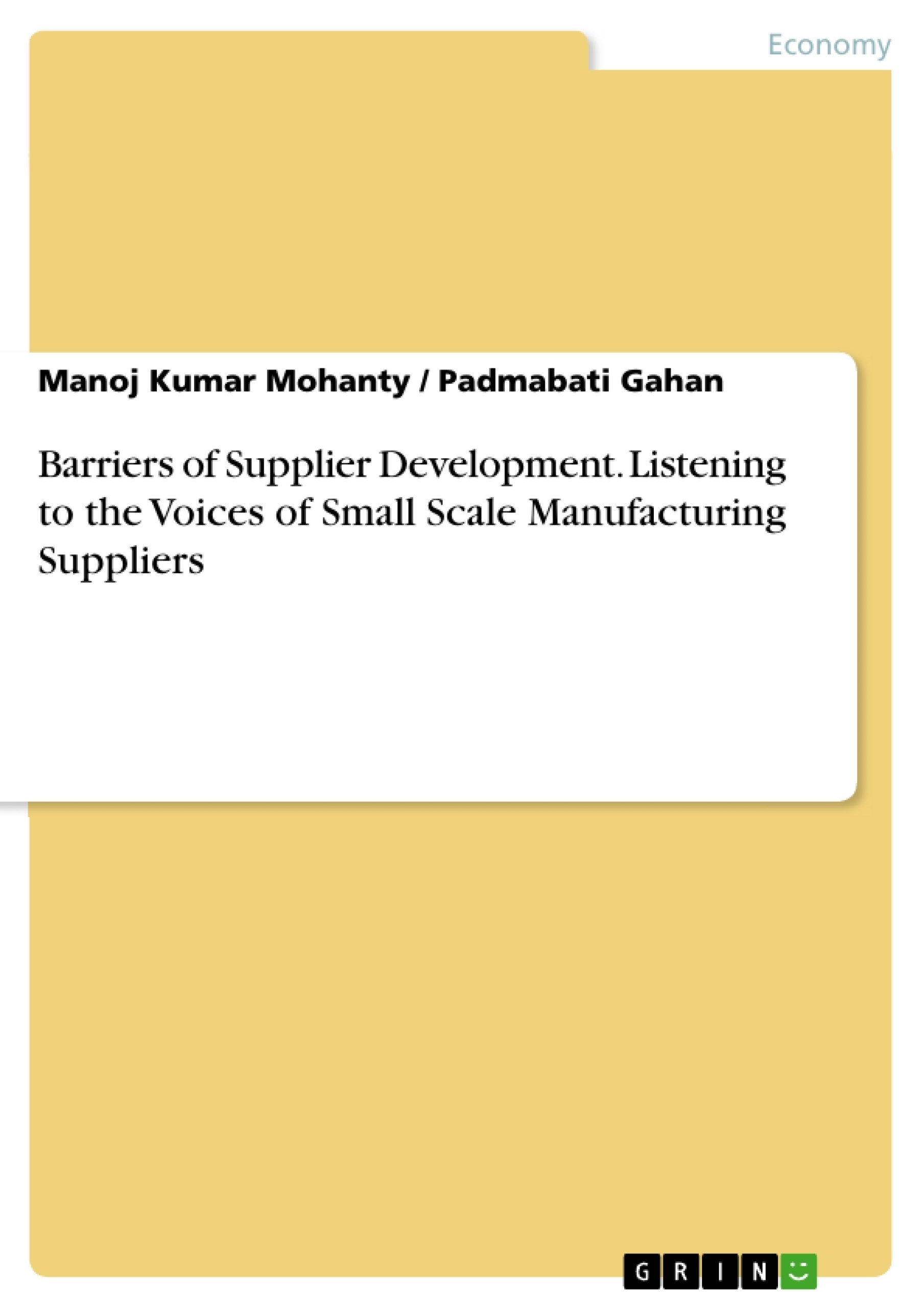The strength of the supply chain largely depends upon the strength of the associated suppliers to the organization. Development of the associates is a direct method to improve original equipment manufacturers or buying organizations’ development. Supplier development is associated with many desirable outcomes like cost reduction, time to market, reduced cycle time, improved quality of the product, manufacturing flexibility and knowledge exchange between business partners. Manufacturing sector plays a vital role in the economy of every country for value creation, contribution to the GDP, boosts foreign exchange reserves, employment generation and poverty reduction. This calls for a special focus on manufacturing sector and so as on manufacturing outsourcing value chain. The role of small scale suppliers (SSI) are substantial in providing the competitive edge to the manufacturing organizations. So it is advisable to keep the SSI suppliers’ growth, development and satisfaction high in order to meet the desired operational flexibility, competitive advantage, time to market, increased market share and improved profit by the large scale organizations. Lot of research activities carried out in reference to the supplier development (SD) from buying firm’s perspective. Supplier development models, theoretical frameworks, barriers of SD explored only from the buying organizations view point. Very little research carried out on SD from selling organization point of view and that too in discrete manufacturing sector, it is not witnessed even one. This book is trying to explore the attributes which are affecting directly or indirectly the development of small scale manufacturing sectors to support the overall value chain.
Inhaltsverzeichnis (Table of Contents)
- Introduction
- Literature Review
- Conceptual Framework
- Theoretical Framework
- Supplier Development
- Barriers of Supplier Development
- Sustainable Supplier Development
- Research Methodology
- Research Design
- Sampling Design
- Data Collection Technique
- Data Analysis Technique
- Data Analysis and Findings
- Background of the Respondents
- Barriers of Supplier Development
- Ranking of Barriers
- Discussion and Interpretation
- Recommendations
- Conclusion
Zielsetzung und Themenschwerpunkte (Objectives and Key Themes)
This book aims to investigate the barriers faced by small-scale manufacturing suppliers in India. The authors aim to identify and analyze the key challenges faced by these suppliers, providing insights into the factors hindering their development. By understanding these obstacles, the book seeks to contribute to the development of effective strategies for promoting supplier development in this sector.
- Barriers to Supplier Development
- Sustainable Supplier Development
- Small-Scale Manufacturing Suppliers
- Research Methodology and Findings
- Recommendations for Improvement
Zusammenfassung der Kapitel (Chapter Summaries)
- Introduction: The introductory chapter sets the stage by explaining the significance of supplier development and highlighting the importance of small-scale manufacturing suppliers in the Indian economy. It also provides a brief overview of the research problem and the objectives of the study.
- Literature Review: This chapter delves into the existing literature on supplier development, examining various theoretical frameworks and conceptual models related to the topic. It explores the different types of barriers that can hinder supplier development and discusses the importance of sustainability in supplier development.
- Research Methodology: This section outlines the research design, sampling methods, data collection techniques, and data analysis procedures employed in the study. It explains how the authors collected and analyzed data to answer the research questions.
- Data Analysis and Findings: This chapter presents the findings of the study, including the demographic characteristics of the respondents and the specific barriers identified. It also analyzes the ranking of these barriers based on the data collected.
- Discussion and Interpretation: This chapter interprets the findings of the study, drawing connections between the identified barriers and relevant theoretical concepts. It explores the implications of these findings for both suppliers and buyers in the manufacturing sector.
- Recommendations: This section provides practical recommendations for overcoming the identified barriers and promoting sustainable supplier development in the small-scale manufacturing sector. It outlines strategies for both suppliers and buyers to improve collaboration and enhance the overall development of the supplier network.
Schlüsselwörter (Keywords)
This research focuses on supplier development, small-scale manufacturing, barriers to development, sustainable supplier development, research methodology, data analysis, and recommendations for improvement. The study utilizes a mixed-methods approach to explore the challenges faced by small-scale suppliers in the Indian context, aiming to provide insights for enhancing their capabilities and contributing to the overall growth of the manufacturing sector.
- Quote paper
- Dr. Manoj Kumar Mohanty (Author), Prof. Dr. Padmabati Gahan (Author), 2019, Barriers of Supplier Development. Listening to the Voices of Small Scale Manufacturing Suppliers, Munich, GRIN Verlag, https://www.grin.com/document/490216



